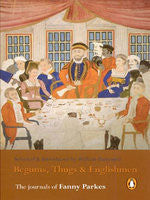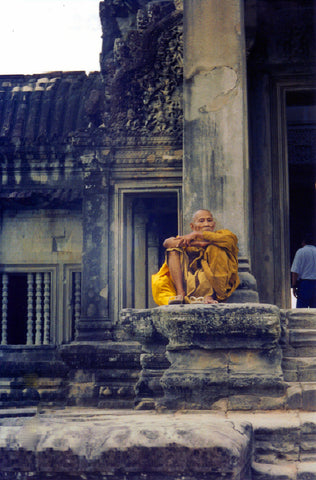Your Cart is Empty
Free Shipping for orders over $49 in Australia, $199 IN NEW ZEALAND/USA/CANADA AND $249 REST OF THE WORLD
Free Shipping for orders over $49 in Australia, $199 IN NEW ZEALAND/USA/CANADA AND $249 REST OF THE WORLD
Add description, images, menus and links to your mega menu
A column with no settings can be used as a spacer
Link to your collections, sales and even external links
Add up to five columns
Add description, images, menus and links to your mega menu
A column with no settings can be used as a spacer
Link to your collections, sales and even external links
Add up to five columns
Book Review: Begums, Thugs and Englishmen: the Journals of Fanny Parkes
by Linda Heaphy March 20, 2017

Fanny Parkes was the daughter of a British colonial officer and the wife of a civil servant who came to India with her husband in 1822 and stayed for twenty four years, traveling extensively throughout Raj India, often on her own, and assimilating all aspects of Indian society and culture. When she returned home she published her memoirs at the behest of her mother, producing an 800 plus page edifice called Wanderings of a Pilgrim in Search of the Picturesque, During Four and Twenty Years in the East; With Revelations of Life in the Zenana.
Fanny Parkes did not have the social standing of her glamorous and well connected peers Fanny and Emily Eden, the sisters of the Governor General of India, Lord Auckland, and thus her Wanderings quickly passed into obscurity while the latter's works Up the Country and Journals were celebrated and have rarely been out of print since they were first published. However, thanks to William Dalrymple, Fanny Parkes' writings have recently been edited and republished under the title Begums, Thugs and Englishmen: the Journals of Fanny Parkes, and are now easily accessible to the modern reader.
Fanny was an eager and passionate woman who entered into her Raj life wholeheartedly and eloquently recorded her thoughts and observations of India during the 1800's, as well as her own sometimes hair-raising experiences while traveling through the Indian countryside. She also became a fluent speaker of Urdu and translated many Indian and Persian proverbs, poems and invocations in her writings. Here she translates a wonderful prayer to Ganesh, beloved elephant headed god and patron of the arts, writing and auspicious beginnings:
Work-perfecting Ganesha! Salamat.
Ganesh! - Ganesh!
Two-mothered! One-toothed!
Portly-paunched! Elephant-faced Ganesha!
Salaam!!
Moon-crowned! Triple-eyed!
Thou who in all affairs claimest precedence in adoration!
Calamity averting Ganesh
Salaam!!
Thou who art invoked on the commencement of a journey,
the writing of a book,
Salaam!!
Oh! Ganesh, put not thine ears to sleep!
Encourage me, and then behold my bravery;
Call me your own fox, then will you see me perform
the exploits of a lion!
What fear need he have of the waves of the sea,
Who has Noah for a pilot?
First born of Mahadeo and Parvarti!
God of Prudence and Policy!
Patron of Literature!
Salaam!!
May it be said,
'Ah! She writes like Ganesh!'
Fanny Parkes' Journals may be regarded as a great travel book of its time, filled with exciting descriptions of Indian life and customs. But more importantly, as an independent female traveler in the Indian Raj, Fanny was uniquely placed to record her observations on many fascinating subjects pertaining directly to women, including that of life in the Zenana, or harem, and the process of suttee, ritual suicide performed by Indian widows to this day. Her legacy is, as Dalrymple puts it, an important historical text for its record of the last moments of a hybrid world between two ancient cultures, forever frozen in time.
References and FurtherReading
Parkes, F 1850. Wanderings of a Pilgrim in search of the Pictureseque, During four and twenty years in the East, with revelations of Life in the Zenana♦. Pelham Richardson, England.
Dalrymple, W 2002. Introduction to Begums, Thugs and Englishmen: the Journals of Fanny Parkes. Penguin Books
The Guardian, Saturday June 9, 2007
Wikipedia Fanny Parkes. Accessed May 2010. http://en.wikipedia.org/wiki/Fanny_Parkes

Leave a comment
Comments will be approved before showing up.
Also in Book Reviews
Articles
About the Author
- Linda has a Honours degree in Marine Biology and a PhD in Ecology from the University of NSW, Australia. She has travelled extensively and is a passionate writer on subjects as diverse as the role played by women throughout history, tribal communities and their customs, symbology and ethnology, talismans and their history. Occasionally she also writes about her travel experiences, her new life on a 25 acres in the Northern Rivers region of northern Australia and her black miniature poodle Phoenix. She is currently writing her first book on talismans.
About Us
-
The Kashgar Philosophy

Kashgar began through a love of travel.
In 1989 my father Bernard packed in his house painting business and set off for two years on a backpacking trek to the remotest corners of the world. When he finally arrived in the oasis city of Kashgar, China, he was so impressed with its history that he decided to start a new life collecting and selling exotic goods from all over the world. For 2000 years the legendary city of Kashgar was a melting pot of ideas and a key trading post on the historic Silk Road. It was this unique combination of philosophy and trade that my father wanted to recreate at home.
Starting in markets in 1991, he opened his first store in the Sydney suburb of Newtown in 1994. I gave up my own career as a government scientist to join him in 2000 and soon convinced my partner Ian to join us in what was to become the Family Business.
Today our version of Kashgar stocks a hugely diverse range of furniture, rugs, textiles, antiques, handicrafts and jewellery sourced from over twenty different countries including India, Nepal, Tibet, China, Thailand, Burma, Laos, the Philippines, Vietnam, Mexico, Peru, Turkey, Palestine, Syria, Afghanistan and Turkmenistan. Our collection includes contemporary and tribal silver and gold jewellery, a unique range of headhunting curios, antique Buddhist relics and a collection of one-off necklaces, earrings and bracelets that I design and create myself using the beads and jewellery making techniques of ethnic minorities from around the globe.
Kashgar is a philosophy as well as a store. We are committed to supporting traditional artisans and small village communities by selling authentic handcrafted goods which are personally collected by us. By supporting traditional methods of design and production we hope to encourage local cottage industries which have a low impact on the environment and help ethnic minorities maintain their self-sufficiency into the 21st Century. We are particularly committed to assisting women around the world and to this end have worked with several organisations including the Hua Bin Women's Union of Vietnam, the East Timorese Women's Association and Tikondane in Zambia. Time honoured means of craftsmanship and traditional ways of life are disappearing as people all over the world give up their identity in favour of jeans and T-shirts. We see our trade as a means of staving off the inevitable encroachment of the 21st century, assisting communities to decide for themselves which parts of the western world they wish to incorporate (medicine, education) and which they wish to reject (prostitution, drug production, begging and servitude to warlords). We encourage our customers to think of the handicrafts and artifacts they buy from us as an investment: a piece of history and a way of life that may soon be gone forever.
Kashgar has recently closed its retail outlet and gone completely online.
In the past our pieces appeared in many movies including The Hobbit, Mission Impossible 2, Queen of the Damned, Scooby Doo, Moulin Rouge and Wolverine, and in many televisions series, as well as in plays, commercials and exhibitions. We've found special pieces for individual customers as well as for film sets, event management companies, hotels, businesses, consulates and embassies. The uniqueness of our stock means that we are also very appealing to interior and fashion designers with a taste for the exotic.
There is something for everyone at Kashgar - collectors, the curious, those looking for a special present or for something unique to adorn the home. Most of our items are one-off specialties; other pieces we only stock in small quantities so as to continuously offer a wide and ever-changing range of interesting products. We are also packed with ideas for decorating home and work premises that will challenge your established concepts of design and storage.

Please enjoy - Linda Heaphy
Become a Kashgar nomad and join our mailing list...
Sign up to get the latest on sales, new releases and more …



